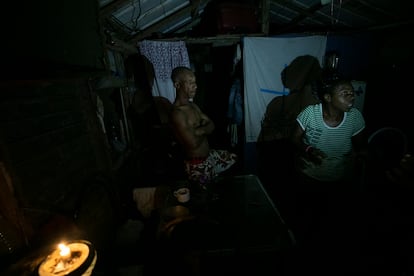Food, electricity and freedom: citizen protest is reactivated in Cuba
The massive mobilizations last weekend on the island are the response to citizens’ fatigue in the face of rampant shortages. The Government puts patches on discontent and looks for culprits in the United States

For some time, Maritza González’s two young children have not known what it is like to sleep until dawn. In her house in Morón, in the Cuban province of Ciego de Avila, Maritza manages, shakes off the mosquitoes, fans them with a piece of cardboard, but her two young children have a hard time keeping their eyes closed. “They can’t sleep because the lights go out every three or four hours,” she says. And if there is no electricity, you can’t turn on the fan or the air conditioner either. “You have to blow air on them with cardboard, and one is also a human being who gets tired of doing this all day long.” For several weeks, the Cuban Electrical Union has been reporting constant power cuts on the island, which, along with the country’s food crisis, unleashed massive protests on Sunday, March 17. The demonstrations have once again put President Miguel Diaz-Canel’s government in jeopardy.
The street mobilization began in a neighborhood of the city of Santiago, Cuba, at around 2:00 p.m., and by Sunday night they had spread to other Cuban provinces, such as Matanzas and Artemisa. While the first demands were for “electricity and food,” the demonstrators then shouted “freedom” and booed the current president. The government cut the internet to prevent the events from being reported and spreading to other areas of the country, but several people managed to share the images of hundreds of people shouting in unison “Patria y vida [Homeland and life]”, a phrase that has become a slogan of the protests.
While other demonstrations of discontent have been reported on the island, these are the largest since the mass protests of July 11 and 12, 2021, when thousands of Cubans took to the streets for the same reasons.
Despite the government’s punishment of previous protests, for which some have received prison sentences of up to 20 years, the economic situation once again brought Cubans back into the streets. The long blackouts of up to 18 hours are reminiscent of those experienced in the 1990s during the so-called Special Period, after the loss of aid from the former Soviet Union. Now, the shipment of fuel from allied countries such as Russia and Venezuela has been affected, in addition to the recurrent breakdowns of the Antonio Guiteras Thermoelectric Power Plant, the country’s main one.
A resident of Santiago, Cuba, who requested anonymity, confirms that the blackouts continue and reports that her grocery store has not received any food for a month. Despite the fact that a popular revolt broke out very close to her house a week ago, she says that the city has returned to normal. To quell the protest, the government sent products such as rice and sugar to some very localized grocery stores. It also deployed the police and military forces to defuse the demonstration.

Díaz-Canel accuses the U.S. of “heating up Cuba’s streets "
The first secretary of the Communist Party in Santiago de Cuba, Beatriz Johnson Urrutia, was the one sent to calm the popular revolt, announcing the immediate shipment of food to certain warehouses in the city. “We cannot deny that it was a very tense situation,” she said later in the official press. “But as always, the people understood.”
On X (formerly Twitter), at the same time that the protests were taking place, Cuban president Miguel Díaz-Canel acknowledged the citizenry’s discontent due to the “situation of electric service and food distribution” and asserted that the authorities’ were disposed to “address the demands” of the people.
But the president, the Cuban Foreign Ministry and the state press have all used the discourse of blaming the protests on the alleged interference of the United States. Díaz-Canel accused “mediocre politicians and terrorists” in South Florida of “heating up Cuba’s streets,” which Vedant Patel, chief deputy spokesman for the State Department, denied immediately. “The United States is not behind these protests in Cuba, and the accusation of that is absurd,” he said in an official statement. “Protests across several cities in Cuba yesterday called for electricity, food, and fundamental freedoms. I think what we are seeing is a reflection of the dire situation on the island,” he added.
Lack of clarity on the number of detainees
Almost three years after the protests of July 11 and 12, the first demonstrations of that magnitude in the country since the Revolution came to power, the cause remains the same: the country’s generalized situation of precariousness.
Camila Rodríguez, the coordinator of the group Justicia 11J, which monitors the situation of the thousands of political prisoners from the previous protests, notes that there were dozens of people arrested during Sunday’s demonstrations, but it has only been possible to confirm the identity of five people, two in the Bayamo demonstrations, two in El Cobre and one in Matanzas. Thus far, at least three of the detainees have been released; two had to pay fines for alleged “public disorder” crimes before they were freed.
However, Raudiel Peña, a lawyer for Cubalex, thinks that “it is very possible that the government will once again resort to the same practices it used after July 11,” such as charging some of those it detained with sedition. “We can’t rule out that this will happen because of the way the Cuban state criminalizes protests,” he explains.
As in the July 2021 demonstrations, this time the government resorted to constantly cutting the internet and deploying the police and military. Although there are several videos showing the police repressing demonstrators, these protests were less violent than the previous ones. “You also have to understand that these protests have not been as massive across the country as the July 11 ones, although there is evidence of protesters being beaten, police intervention, and militarization,” Peña says.
Because the government has traditionally repressed those who protest on the island, for years Cubans have found it difficult to go out and claim the public space. Although a survey by the independent project CubaData shows that one out of every two Cubans intends to participate in civil protests, few end up joining the demonstrations. Discontent in the country is only growing because over the last five years (at least) Cuba’s situation has worsened, with no solution in sight in the short term.
For Cubans, 2023 was marked by food shortages and the lack of medicines and fuel, which affected transportation and caused many blackouts over the course of the year. The economy contracted 2%, affected by the coronavirus pandemic and the decline of the tourism sector; these were aggravated by the U.S. economic embargo against the island, inefficient government management and several errors in policy measures.
Since then, a series of government decisions have followed one after another, some of which suggest that the country’s leadership is not in good shape: not only did they implement a package of economic measures that increased the cost of living for Cuban families, but at the beginning of 2024 they had to halt those measures. In addition, without anyone suspecting it, they announced the rapid dismissal of the then Minister of Economy, Alejandro Gil Fernández, who was later found to be under investigation for corruption.
On more than a few occasions the Minister of Energy and Mines, Vicente de la O Levy, has acknowledged the lack of fuel in the country and has said that the government will provide a solution. In the midst of the sustained inconvenience caused by the lack of electricity in Cuba, the minister said that “the fuel situation is going to be better in the future.” But Cuban economist Omar Everleny Pérez Villanueva, the former director of the Center for the Study of the Cuban Economy at the University of Havana, told EL PAÍS that he believes 2024 will be an even worse year than the previous one.
“January, February and March have been truly terrible. These are months in which there has been not only a lack of electricity, but a lack of water, a lack of food. There really is a very difficult situation in the country.” Everleny insists that the current blackouts on the island have been compounded not only by the lack of food, but also by the non-compliance with the delivery cycles in the country’s grocery stores. “There are provinces, such as the eastern provinces, where products have not been delivered for a month. It does not seem to me that there is a short-term solution. There is no fuel because there is no money to pay for the ships, and the money to have it has to be generated. I do not believe that there are enough imports to make up for this lack in the short term.”
Sign up for our weekly newsletter to get more English-language news coverage from EL PAÍS USA Edition
Tu suscripción se está usando en otro dispositivo
¿Quieres añadir otro usuario a tu suscripción?
Si continúas leyendo en este dispositivo, no se podrá leer en el otro.
FlechaTu suscripción se está usando en otro dispositivo y solo puedes acceder a EL PAÍS desde un dispositivo a la vez.
Si quieres compartir tu cuenta, cambia tu suscripción a la modalidad Premium, así podrás añadir otro usuario. Cada uno accederá con su propia cuenta de email, lo que os permitirá personalizar vuestra experiencia en EL PAÍS.
¿Tienes una suscripción de empresa? Accede aquí para contratar más cuentas.
En el caso de no saber quién está usando tu cuenta, te recomendamos cambiar tu contraseña aquí.
Si decides continuar compartiendo tu cuenta, este mensaje se mostrará en tu dispositivo y en el de la otra persona que está usando tu cuenta de forma indefinida, afectando a tu experiencia de lectura. Puedes consultar aquí los términos y condiciones de la suscripción digital.









































